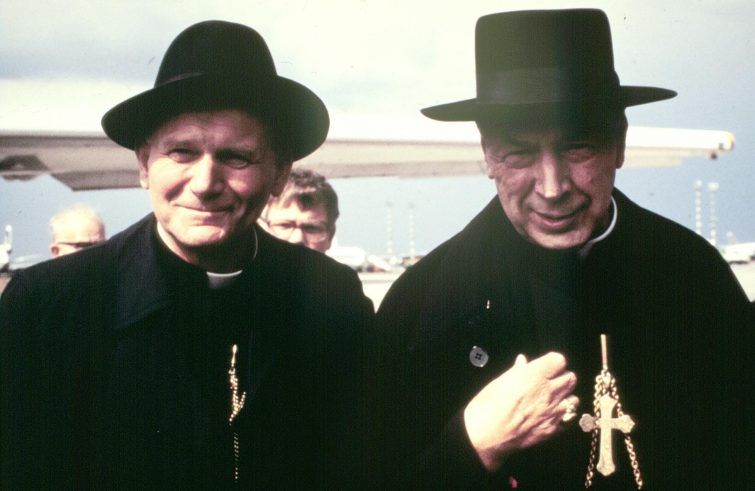
The Polish Cardinal Stefan Wyszyński died forty years ago. During the conclave held in the autumn of 1978, he told his brotherly friend Cardinal Karol Wojtyla: “If they choose you, you must accept.” A few days later, Cardinal Wyszyński knelt before Pope John Paul II, his compatriot, some twenty years his junior, as a gesture of respect, pledging obedience and loyalty to the Pope. He remained faithful to these virtues until his death in Warsaw on May 28, 1981, after suffering from severe cancer. His solemn funeral ceremony took place a few days later in Krakow, presided over by the then Vatican Secretary of State, Cardinal Agostino Casaroli. Numerous Cardinals and Bishops from around the world concelebrated the service. Among them figured the then Archbishop of Munich and Freising, Monsignor Joseph Ratzinger. The Communist authorities in Poland, grown weaker by the rise of the Solidarity movement in the spring of 1981, had to yield to the will of the people and consent to a public religious ceremony with millions of faithful deeply saddened by the loss of the “spiritual leader of the nation.” The ceremony took place just a few days after the assassination attempt on John Paul II in St Peter’s Square, still in a weakened state of health.
 Love for his homeland. The story of the Polish cardinal is equally fascinating and complex. Cardinal Stefan Wyszyński was born on August 3, 1901 in the village of Zuzela in eastern Mazovia. He was ordained a priest at the age of 23, on 3 August 1924, and was made bishop in May 1946. His religious vocation emerges strongly in his writings during his period of imprisonment in the years 1953-56. Cardinal Kazimierz Nycz laz, Archbishop of Warsaw, recently recalled that Wyszyński’s life was imbued with the unity between his own life and the Magisterium of the Church. Starting with his Episcopal coat of arms, on which he placed the words “Soli Deo”, Wyszyński embodied “love for his homeland and love for the Church, love for his enemies and for all humanity”, said the Archbishop of Krakow.
Love for his homeland. The story of the Polish cardinal is equally fascinating and complex. Cardinal Stefan Wyszyński was born on August 3, 1901 in the village of Zuzela in eastern Mazovia. He was ordained a priest at the age of 23, on 3 August 1924, and was made bishop in May 1946. His religious vocation emerges strongly in his writings during his period of imprisonment in the years 1953-56. Cardinal Kazimierz Nycz laz, Archbishop of Warsaw, recently recalled that Wyszyński’s life was imbued with the unity between his own life and the Magisterium of the Church. Starting with his Episcopal coat of arms, on which he placed the words “Soli Deo”, Wyszyński embodied “love for his homeland and love for the Church, love for his enemies and for all humanity”, said the Archbishop of Krakow.
He was also “a man of hope, prepared to entrust himself to Divine Providence, and a man of wisdom, capable of casting his gaze towards the future, even hundreds of years from now.”
He was a ”man of faith, committed to the soundness of acts of faith, and of daily expressions of religious belief.” Finally, he “exemplified the role of priest and bishop, of the industrious man, conscious of the importance of service to the Church and to the people.”
Three years in prison. Card. Stefan Wyszyński took possession of his “titular” church in Rome, Santa Maria in Trastevere, on May 30, 1957. Although he had been created a cardinal by Pope Pius XII on 12th January 1953, the State authorities did not allow him to go to Rome to receive the insignia of the cardinalate for over three years. In September 1953, a few months after his elevation to the cardinalate – which he himself considered not a personal recognition but “a medal conferred on the Catholic and ever faithful Poland” – Communist authorities imprisoned Wyszyński, thereby cutting him off completely from the outside world.
The communist regime regarded the new cardinal as a dangerous enemy.
During his years of imprisonment, having served as military chaplain of the Armia Krajowa (National Clandestine Army, the major resistance movement in Nazi-occupied Poland) during the Second World War, Wyszyński courageously and firmly opposed all proposals of collaborationism and continued his relentless efforts to strengthen the faith of the Polish people.
Ties with Rome. His diary records an episode that occurred in 1957 during his journey to Italy. With zeal and deep faith, Wyszyński narrates that “while travelling to the spiritual capital of Christianity” he carried with him “a replica of the miraculous icon of Our Lady of Jasna Góra, Queen and Protector of Poland” which he gave to the Pope as a gift, “a symbol of Poland’s unity with the world’s capital.”
He saw the assignment of the Basilica in Trastevere as his titular see as a further “sign of the spiritual bond between Rome and his Poland.”
In the same year, he promoted a nationwide initiative: a Great Novena prayer, in preparation for the Millennium of Christianity in Poland, celebrated in Jasna Góra on 3 May 1966. Pope Paul VI was invited to the event, but was unable to attend because the state authorities refused to permit him to enter the country.
The visit of John Paul II. The first visit of John Paul II to Poland in the late spring of 1979 was to him an extremely touching and memorable moment. The visit was the result of a diplomatic masterpiece performed by the Primate himself, who managed to convince the communist authorities that the visit of the then Polish Pope to his homeland would not pose a problem, and that in fact it would only bring positive results for all. Indeed, the words pronounced by Pope Wojtyła on 2 June 1979 in Warsaw, during the Solemn Mass celebrated outdoors in front of millions of faithful and broadcast live on public television (despite the ban on religious broadcasts), were to transform Poland and the world with it. It was an epoch-making event that culminated in the collapse of the Berlin Wall that separated Europe into ‘East’ and ‘West.’
Mother Róża Maria Czacka. The beatification of Cardinal Stefan Wyszyński will take place on September 12. A solemn ceremony, eagerly anticipated by the Polish people, will be held in Warsaw in the same square where John Paul II addressed the faithful in 1979, the same square where the solemn celebration of the funeral of the ‘Primate of the Millenium’ was held in 1981. The beatification of Mother Róża Maria Czacka (1896-1961), founder of the Society for the Care of the Blind, the first in Poland, and of the Centre for the Blind in Laski, near Warsaw, will take place on the same day. Mother Czacka and Cardinal Wyszyński knew each other, and they worked together for some time during the war. Both devoted themselves to making others see a light of hope in the darkest night. They must not be forgotten.











